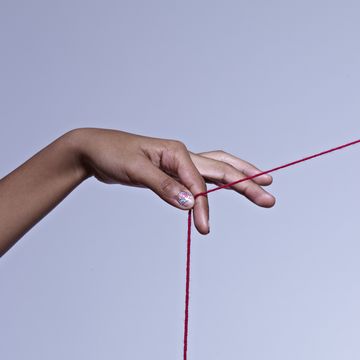True story: I didn't really understand what gaslighting was until I found myself a victim of it.
I'd been seeing my on-again, off-again ex for several months, and things were going pretty well—up until I found out via a disturbing butt-dial that he was "seeing" someone else behind my back. We weren't official, so it wasn't exactly cheating...but when I confronted him, he accused me of making the whole thing up.
Yep, I had a phone call documented in my recent-calls log, and he had the audacity to tell me that I'd made up what I heard. (Trust me...no one can make up what I heard.)
The worst part was, I realized at that moment how many times I pushed aside my suspicions because every time I brought up the girl (yes, I know her, and yes, they're now dating), he got upset with me for not trusting him.
Of course, he's not the only guy of late to gaslight. Gaslighting happens often—in fact, you may have heard it (or seen the hashtag) used to describe everything from Donald Trump's political antics to high-strung characters in thriller novels (hi, Crazy Amy).
But it's not something to mock (as in the case with Trump) or enjoy (though I'm still waiting on a book to beat Gone Girl). If you're experiencing gaslighting, you may actually be in an emotionally abusive relationship. Yes, it’s that serious.
Okay, but what is gaslighting exactly?
"The term gaslighting originated from an old movie, where a woman lived with a man in a home with old-fashioned gas lights," explains Lisa Marie Bobby, PhD, founder and clinical director at Growing Self Counseling & Coaching in Denver, Colorado.
"The man was trying to drive this woman crazy. He would consistently turn the lights dimmer and dimmer in their home, but denied that it was dimmer and pretended that the light was normal—and the woman began to doubt her own senses. Over time, she went insane." (If you’re into 1944 Ingrid Bergman movies, one version of this movie is Gaslight.)
Today, gaslighting someone is just about as sinister. "Gaslighting means you're being made to doubt your own feelings, thoughts, intuition, and judgment when they are, in fact, reliable sources of information you should trust," says Bobby.
One example: Your partner is cheating on you, and you ask about the random text convos they're having or those sudden late nights at the office. Their response? You're crazy for imagining their phone light up, or you’re ungrateful for not acknowledging their hard work.
Yeah, real nice. But it’s not just to save their own asses. "Gaslighting is a form of emotional abuse," says Bobby, who’s also the author of Exaholics: Breaking Your Addiction to an Ex Love.
It’s one reason why those who are victims of domestic abuse have a hard time leaving their abusers, or go back to them. "The victims blame themselves for the abuse they are experiencing because their abuser has made them believe they are at fault," she explains. "Their own feelings and judgment about their worth, what love should look like, and how they should be treated has been gaslighted out of existence by their abuser."
Because gaslighting is a manipulation of the mind, it can be tough to realize that it is, in fact, happening to you. Here are 9 signs you’re being gaslighted:
1. Your partner flips your questions around.
Anytime you confront your partner, they question you back. This way, they turn the situation around on you so you feel like you're the one with the problem—not them.
2. You feel bad about yourself.
You used to have a certain confidence about you, but now you feel stupid or silly pretty often. Or maybe your friends are asking you what’s wrong because you’re suddenly on edge all the time. Bobby says these are classic signs in a new partnership that you're being gaslighted.
3. You’re isolated.
Is your partner taking steps to cut other people out of your life, or telling you how they’re bad for you and don’t have your interests at heart?
If you’re being gaslighted, your partner will try to ensure you look to them (and only them) for the truth. "If independent third parties start weighing in to support the perspective of the gaslight-ee, the abuser loses power and control over the victim," says Bobby.
4. Your concerns are disregarded.
When you confront them about something, like signs of substance abuse, for example, they tell you you’re out of line for questioning them, their choices, or their lifestyle, says Bobby. It’s all an effort to make you think you’re overstepping boundaries or trying to control them when your concerns are perfectly valid. (Remember: It’s the exact opposite of what’s really going on.)
5. They tell you that you have trust issues.
An easy way to make you stop questioning them? Convincing you that YOU are the one with the problem and that you're just transferring your insecurities onto them, says WH advisor "Dr. Chloe" Carmichael, a licensed psychologist and author of Dr. Chloe's 10 Commandments of Dating.
Keep in mind that while having trust issues from past relationships or your childhood can definitely carry over into new relationships, when your gut is telling you that something is off, it's almost always right.
Of course, it's hard to separate intuition from anxiety when you're being gaslighted, but oftentimes in confusing situations, they're coming from the same place.
Trust it‚ especially when someone else tells you not to.
6. They make you reconsider past events.
Gaslighters have a way of repainting history to make themselves out to be a better partner. That big fight last Halloween, where they put you down repeatedly in front of your friends? Nope, they weren't obnoxiously drunk, and the offensive comments they made were in response to your disgusting behavior at the party. At least, that's what they'll tell you now.
It's important to understand that everyone experiences moments in life differently, and your brain can tweak bad memories to protect yourself from the pain. But if your partner consistently makes you question how you remember things going down, they are most likely trying to alter your perception of reality in order to reframe how you look at them now, explains Dr. Chloe.
9. They straight-up call you crazy.
A lot of partners sometimes throw out the "C word" (crazy) in a moment of disagreement, but if it happens regularly and it's said in an accusatory way (versus a joking manner), your S.O. is either (a) not a good match for you (because they just don't understand you), or (b) gaslighting you—or both.
Calling someone you love "crazy" (or similarly, "paranoid," "dramatic," etc.)—consistently and not in an endearing way—is an attempt, subconscious or not, to make you think of yourself that way, says Dr. Chloe.
Even if you do tend to be a bit dramatic about things or have an anxious attachment style, your S.O. shouldn't be pointing out your flaws as a way to put you down. They should only acknowledge them as part of a nonjudgmental, joint conversation to improve your communication as a couple. Gaslighting is the opposite of that.
7. You're scared to confront them.
This is the case for any emotional abuse, but especially for gaslighting—when you've been made to believe that you're paranoid or crazy—you find yourself uneasy about having serious conversations with your partner.
You worry how they'll react (not good) and how they'll make you feel (even worse), so you decide to suck up whatever's bothering you in hopes of keeping things smooth sailing.
But note, there is no smooth sailing when gaslighting is involved. No relationship can flourish when there's emotional abuse and intentionally avoided communication, Dr. Chloe explains.
And the longer you're a victim of gaslighting, the more your mental health will suffer, and that's not okay.
8. They put your relationship on the line.
As a way of controlling you, your partner might throw out the whole "If this is how it's going to be, I don't think this is going to work" response. (A more extreme version: "Get it together or I'm done.")
Threatening the relationship every time you approach your partner about an issue (or every time they have an issue with you) is their attempt to make you conform to their needs, because chances are, you'll want to do whatever you can to save your bond.
"This is especially true if they vacillate between making earnest promises that they'll never leave you and then within a day to a week later, they're pulling the rug out from underneath you and threatening to leave," says Dr. Chloe.
This kind of partner behavior is not only toxic for the relationship but also incredibly destructive to you as an individual, as it can cause you to sacrifice your own needs...and not even notice.
What should you do if you’re being gaslighted?
First, if any of this sounds familiar to you in your relationship, you’re going to need a big dose of help from a therapist, friend, or support group. These people or resources "can help you get the outside perspective you need to reinforce your own judgment," says Bobby.
These people will be your source of truth and tell you that your thoughts and beliefs are, in fact, correct. "With that outside perspective, you can begin to trust yourself again, and also view your partner’s manipulations for what they are: efforts to mislead and control you," she says.
You can also try journaling, not only to get out your own thoughts, but also to write down events as they unfold (a.k.a., create a literal track record.) That way, as your partner continues their mindf*ckery and tries to make you question everything, you can recall what actually happened.
Hopefully, that'll give you some courage to get yourself out of the relationship instead of making excuses for your partner and staying victim to their gaslighting techniques. You deserve so much better—and that's the truth, no matter what anyone else has led you to believe.
If you're in an abusive relationship, you can get help from The National Domestic Abuse Hotline.


Jessica Migala is a health writer specializing in general wellness, fitness, nutrition, and skincare, with work published in Women’s Health, Glamour, Health, Men’s Health, and more. She is based in the Chicago suburbs and is a mom to two little boys and rambunctious rescue pup.













